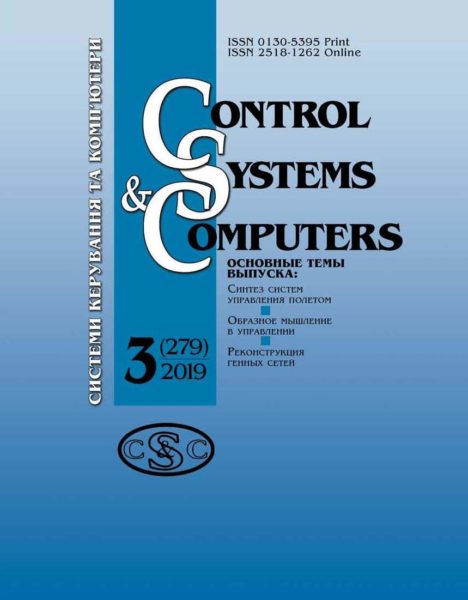Control Systems and Computers, N4, 2016, Article 7
DOI: https://doi.org/10.15407/usim.2016.04.062
Upr. sist. maš., 2016, Issue 4 (264), pp. 62-70.
UDC 330.46:338.431.84
Sobolevskaya L.I., International Research and Training Center for Information Technologies and Systems NAS and MES of Ukraine, Glushkov ave., 40, Kyiv, 03187, Ukraine
Approach to the Intellectualization of the Decision Support Systems in the Evaluation and Analysis of the Plant Growing Enterprises
The Approach to the Intellectualization of the Decision Support Systems in the Evaluation and Analysis of the Plant Growing Enterprises Keywords: agrarian sector, expert systems, Bayesian approach, Bayesian Networks. Expert systems (ES) are regarded as as type of system for the support of decision-making processes which allows using knowledge and expertise accumulated by the specialsts to generate new knowledge. The aim of the research is to define the main principles of the development of a knowledge-oriented model taking into consideration the factors necessary for the stable development of the plant growing branch. The research proves expediency of constructing and using the Bayesian Belief Networks as an expert system (ES) for analysing the economical effectiveness of plant growing enterprises. For calculation of the certain indices it is offered to construct and use the machine and probabilistic model for the research of the material migration and accumulation in a particular soil type when estimating the crop capacity of agricultural plants. The developed model systems allows to rang the enterprises according to the indices characterising the economical stability of the branch. Intellectualization of the decision-making processes in the framework of modern informational executive systems facilitates the effectiveness of the managerial decision-making.
Download full text! (In Russian).
Keywords: agrarian sector, expert sittings, Bayesian approach, Bayesian networks.
- Butayev, SH. Intellektualizatsiya protsessov prinyatiya resheniy v informatsionnykh sistemakh upravleniya. http://infocom.uz/2008/05/09/intellektualizatsiya-protsessov-prinyatiya-resheniy-v-informatsionnyih-sistemah-upravleniya (In Russian).
- Bidyuk, P.I., 2005. “Otsinyuvannya i prohnozuvannya stanu maloho pidpryyemstva za dopomohoyu merezhi Bayyesa”. Nauk. pr. Mykolayivsʹkoho der. hum. un-tu im. Petra Mohyly, 44, pp. 7–29. (In Ukrainian).
- Bidyuk, P.I., Kozhukhivsʹkyy, A.D., Kozhukhivska, O.A., 2013. “Systema pidtrymky pryynyattya rishen dlya analizu i prohnozuvannya stanu pidpryyemstva”. Prohresyvni informatsiyni tekhnolohiyi. Radioelektronika, informatyka, upravlinnya, 1, pp. 128–136. (In Ukrainian).
- Pearl, J., 1988. Probabilistic Reasoning in Intelligent Systems: Networks of Plausible Inference. J. Pearl–San Mateo, CA (USA): Morgan Kauffmann Publ., Inc., 550 p.
- Zhurovsʹkyy, M.Z., Bidyuk, P.I., Terentʹyev, O.M., 2007. “Systemna metodyka pobudovy Bayyesovsʹkykh merezh”. Naukovi visti NTUU «KPI», 4, pp. 47–61. (In Ukrainian).
- P.I. Bidyuk, YU.YU. Shcherbanʹ, V.YU. Shcherban et. al., 2004. Systemy pidtrymky pryynyattya rishen – proektuvannya ta realizatsiya. Kyyivsʹk. nats. un-t tekhnolohiy ta dyzaynu. K., 112 p. (In Ukrainian).
- Sobolevska, L.I. Pryntsypovi pidkhody do upravlinnya stiykym rozvytkom ahrarnoho sektora. Materialy shkoly-seminaru «Perspektyvni tekhnolohiyi pryynyattya rishenʹ v umovakh system intelektualʹnoho upravlinnya biznesom». Materialy shkoly-seminaru. Zhukin, 30 chervnya – 5 lypnya 2014, pp. 184–194. www.irtc.org.ua (In Ukrainian).
- Mikhalevich, V.S., Shor, N.Z., 1961. Metod posledovatel’nogo analiza variantov pri reshenii variatsionnykh zadach upravleniya planirovaniya i proyektirovaniya”. IV Vsesoyuzn. matematicheskiy s”yezd. L.: LGU, 91 p. (In Russian).
- Sobolevska, L.I., Tsyupko, S., 2005. “Modelyuvannya protsesu vnesennya khimichnikh rechovin u grunt pevnogo tipu”. Yekonomist, 2, pp. 71–73. (In Ukrainian).
- Bidyuk, P.I., Terent’yev, A.N., Gasanov, A.S., 2005. “Postroyeniye i metody obucheniya Bayyesovskikh setey”. Kibernetika i sistemnyy analiz, 4, pp. 133–147. (In Russian).



